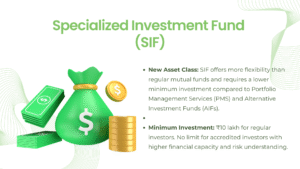The Securities and Exchange Board of India (SEBI) introduced a new investment vehicle that sits at the intersection of mutual funds and portfolio management services (PMS). Called ‘Specialised Investment Funds’ or SIF, these products will have a minimum investment threshold of Rs 10 lakh and offer investors exposure to advanced investment strategies.
These investment strategies could include exposure to equity, debt, real estate investment trusts (REITs) or derivatives like futures and options (F&O).
This would mean that, depending on the individual strategy chosen by the asset management company (AMC), an SIF could offer a higher risk, higher return profile compared to a regular equity fund.
The demand for a SIF-like product has long been pending, as investors have sought a product that offers something more advanced than a regular mutual fund but is more affordable than PMS, which offers exotic strategies but keeps the minimum investment threshold at Rs 50 lakh per investor.
The SIF will also be structured like a mutual fund, offering similar investment and redemption procedures and similar tax treatment for both the end investor and the fund company managing the assets.
Over time, PMSs have evolved to become complex products, especially for the AMC, as they manage each investor’s portfolio individually.
To safeguard investor interest, SEBI has imposed certain limitations on the SIF, such as a maximum of 10% investment in any one listed company at the fund level and 20% for any issuer of debt security. However, government securities (G-Secs) and treasury bills (T-bills) are exempt from the restrictions.
Fund managers managing the SIF will need to be certified by the National Institute of Securities Market (NISM).
The structure of the SIF will allow the fund manager to pursue not only strategies seeking excess returns through bolder investment bets or exotic derivative strategies but also optimising the risk-return profile by seeking exposure to a more diversified asset exposure, depending on the market environment.
Key Points About Specialized Investment Fund (SIF)
Overview:
- New Asset Class: SIF offers more flexibility than regular mutual funds and requires a lower minimum investment compared to Portfolio Management Services (PMS) and Alternative Investment Funds (AIFs).
- Minimum Investment: ₹10 lakh for regular investors. No limit for accredited investors with higher financial capacity and risk understanding.
Operational Features:
- Scheme Categories: Mutual funds can launch multiple categories under SIF.
- Segregation: No need to separate MF and SIF operations, but branding and advertisement must be distinct.
- Separate Identity: Fund houses must create a separate website and identity for SIF.
Key Regulations:
- TER Structure: Similar to mutual funds with AUM slab-wise Total Expense Ratio (TER).
- Approval: Fund houses need SEBI approval through a draft offer document to launch SIF.
- Fund Manager: Must hold relevant NISM certification as specified by SEBI.
Investment Guidelines:
- Debt Investments:
- Up to 20% of NAV in money and non-money market debt securities (not below investment grade).
- Limit extendable to 25% with trustee approval.
- No limit for government securities or debt ETFs.
- Equity Investments:
- Single issuer limit: 10% of NAV.
- Up to 15% exposure to paid-up capital voting rights of a company.
- REITs & InvITs:
- Up to 20% of NAV; single issuer limit: 10% of NAV.
Strategy Options:
- SIF allows close-ended, open-ended, and interval strategies.
Risk Management & Governance:
- Trustees must:
- Establish internal control and risk management mechanisms.
- Be accountable for investor protection, disclosures, and reporting.
- Investor Information: SIF must disclose risks and provide adequate information to help investors make informed decisions.
Launch Criteria:
- SEBI will release detailed criteria for launching SIF.
This framework makes SIF a versatile investment option catering to high-net-worth and accredited investors while maintaining transparency and risk control.
